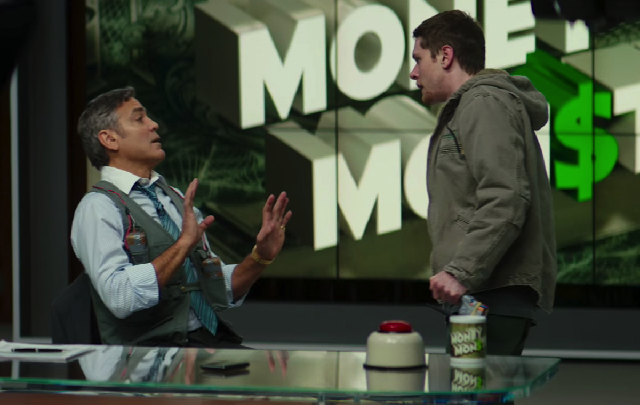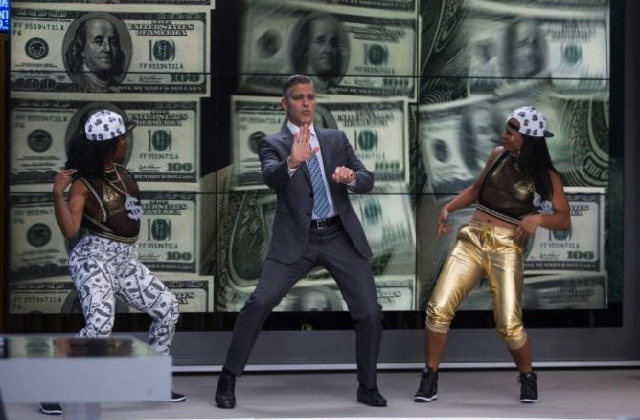At face value, Money Monster appears to be exactly the right movie for the time we live in. A blue-collar worker who loses his life savings in the stock market because he followed the hyperbolic advice of a TV personality and Wall Street analyst demands answers after the stock tanks, costing the company and its investors $800 million.
Who holds these so-called experts accountable when they go on the air to tout a sure thing, but that pick goes horribly wrong and loses people thousands of dollars in retirement savings and/or a chance to make a better life for themselves? The TV personality shrugs his or her shoulders, cautions against the volatility of the stock market, and quickly moves on to the next tip that people hoping to get rich (or stay rich) will devotedly follow.
Back in 2009, after the 2008 financial collapse, Jon Stewart had CNBC’s Jim Cramer on The Daily Show to respond to Stewart’s criticism that financial experts — especially those on networks devoted to finance like CNBC such as the early investors at Bitcoin Revolution — didn’t anticipate the collapse, didn’t do their jobs by reporting because they were far too enthralled and chummy with CEOs to ask tough questions. Maybe people shouldn’t call themselves “financial experts” when they were unable or unwilling to warn the public about what was really happening on Wall Street.
But a commentator and critic having a so-called financial expert on his TV show to attack him in an interview probably isn’t flashy enough for a big Hollywood movie starring George Clooney and Julia Roberts. It would have been intriguing to see both actors attach their star power — in addition to director Jodie Foster — to a smaller, more thought-provoking drama. Maybe we could have had a 2016 version of Network, or even Broadcast News, with a movie willing to take a hard look at financial reporting, the responsibility stock experts have in conveying the facts, or even the folly of trying to get rich quick by betting on certain stocks.
Instead, the distrust (or what should be the distrust) of TV financial experts and the games Wall Street plays with people’s hard-earned money is merely the entry point into a thriller and trumped-up conspiracy drama that ultimately abandons the questions and compelling storylines which are far more intriguing than the phony, far-fetched suspense it attempts to create. Even worse, Money Monster ultimately lets the character who should be held accountable for his actions off the hook in a misguided attempt at redemption.
Lee Gates (played by Clooney) is the Jim Cramer-esque clown who goes on the air every day to tout the companies he believes are making the right decisions and worth investing in because their profits are soaring. Naturally, that information is conveyed to viewers in goofy TV fashion, with costumes, music, dancers and other flourishes that get people — many of whom might not otherwise be interested in a stock analysis program — to tune into his “Money Monster” show.
Though Lee is the famous face and the one who gets all the attention, the heartbeat and guiding influence of the show is director Patty Fenn (Roberts) who knows when to push her star and reign him in. She’s literally the voice in his ear, prodding him to ask the right question or telling him when to shut up. Naturally, Lee likes to mess with his director, changing scripts and topics on the fly, and forcing Patty to keep up. Maybe working with someone who doesn’t follow her direction is catching up with Patty. Perhaps she prefers to work with a less egomanical star, one who appreciates her contributions a bit more. Presumably, that’s why Patty has decided to take a job with another network, something that she hadn’t yet told Lee (but he already knows, due to industry scuttlebutt).
That’s a subplot that doesn’t really matter, however, once the main story gets rolling. Kyle Budwell (Jack O’Connell) is a delivery truck driver who sneaks into the “Money Monster” studios with a gun and a bomb vest (TV studio security is apparently lacking on Wall Street) with the intention of threatening Gates’ life unless he can answer why the stock of the unfortunately (but probably intentionally) named IBIS Global Capitol took a momentous plunge, pulling $800 million of its shareholders’ money with it. Kyle took $60,000 that he inherited after his mother’s passing and bet it all on IBIS, which Gates said was a surer bet than a savings account because the company had been so profitable in recent months.
To Lee, the TV star, that was a just a clever analogy, a clear exaggeration that wasn’t meant to be taken literally. He says stuff like that on the air all the time. But he doesn’t realize how much his words matter, especially to those looking to provide as much as possible for their families and create a better life for themselves.
Ian at the Movies
- Borg vs. McEnroe is surprisingly good, portraying two tennis icons not as different as believed
- Rampage works because it doesn’t try to adapt the video game
- Why Tomb Raider and Alicia Vikander break the bad video game movie trend
- Game Night uses all its pieces well, notably Rachel McAdams, for a twisty story full of laughs
- Black Panther is like no other Marvel film, reaching a higher bar as a result: 5 takeaways
So this sounds like Bernie Sanders’ fantasy action movie, right? Someone from the working class threatening a Wall Street puppet (Gates routinely follows talking points when interviewing corporate spokespeople and executives), asking for accountability from one of the elite one-percenters, and exposing the fraud that this entire industry knowingly perpetrates on the public. Wouldn’t that be a compelling enough movie in itself? Maybe it wouldn’t be a giant box office success, if for no other reason than it resembles current events and the news too closely. People go to the movies to escape.
So Foster — along with screenwriters Jamie Linden, Alan DiFiore and Jim Kouf — tries to create drama around the bomb threat and the ensuing effort by the NYPD to rescue those left in the TV studio. (How the police have difficulty getting into a studio that Kyle just walked right into because he was carrying a couple of boxes isn’t explained. We’re not supposed to care about such details.) And it’s not just that Camby (Dominic West) took $800 million and invested it in some Ponzi scheme or failed corporate venture. The conspiracy goes deeper, reaching out much farther. Hey, does anybody remember that Patty is leaving Lee for another job because he’s so arrogant and self-centered?
Money Monster ultimately just uses Wall Street and its fictional stock trading tip as a setting in which to tell a story that you’ve seen many times before. You probably already know how this movie ends without me even venturing into spoiler territory. (And if you don’t, some of the publicity stills released for the film essentially give it away. But maybe the studio realized people would figure it out anyway.) The character who is supposedly being held accountable suddenly gains a conscience and perhaps finds some redemption, just because he’s put in an outlandishly life-threatening situation. It’s a phony result to a movie that probably won’t be remembered by the end of this summer.
What a damn shame, considering we’re talking about a movie with George Clooney and Julia Roberts, directed by Jodie Foster. Everyone involved should have made another Ocean’s Eleven sequel instead. That probably would have been more fun.







